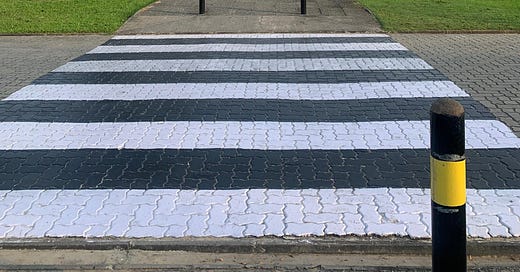Hey! Happy new month!
As we step into the final month of the year, I want to share something interesting with you—something that will help you master the art of eavesdropping for growth.
The Framework of Intention!
It is something I’ve been unknowingly practising for a while. It wasn’t until after the COVID-19 pandemic lockdown that I encountered Bioverse, an online community that has truly institutionalised this way of thinking. What I’m about to share is more than just a concept—it’s how I try to live each day. It’s about slowing down, expressing gratitude, and taking responsibility. That’s the framework.
Slow Down.
In a world that never stops, we often forget to pause. A few days ago, as I was driving from the airport to my residency on campus, I decided to call a friend. The three-hour journey was already making me feel nauseous, so the call was a welcome distraction—especially since we’d been postponing it for some time.
For over an hour, we spoke about her life and growth. She shared that, despite all her progress, she still feels like she hasn’t done enough. Just three years ago, she was in a difficult phase where nothing seemed to make sense. But we took a leap of faith, and I’ve watched her evolve since then. I reminded her that compared to where she was, she had made significant strides. Slowing down isn’t about rushing; it’s about observing and being present.
We often get caught up in the bustle of life, and in those moments, we forget to truly be present. Months ago, I learnt from a friend that sometimes during conversations, I go on and on, not listening to the other person. In those moments, I wasn’t slowing down; I wasn’t listening. I have since become conscious of it.
Like the two instances I have shared, slowing down works in various ways. Whether it is time to rest, heal, or navigate a situation, you need to slow down.
Give Gratitude
The downside of not slowing down to reflect is that sometimes we miss the opportunity to acknowledge all we have to be grateful for. Before, and even after, my graduation last week—yay, I’ve graduated!—I found myself reflecting on the last six months: the experience in the classroom, adjusting to a new job, navigating some tough breakups, getting sick at least once a month, and the support of my family. In those quiet moments of reflection, I realised just how much I had to be grateful for. I counted the number of trips I made—not just the countless road trips, but over 17 flights. That’s a lot! On one of those flights, we experienced terrifying turbulence that made it feel like the plane might crash, but we landed safely.
This is one of the insights you gain when you pause and eavesdrop on your own life: there is so much to be grateful for, even in the wins, the losses, and everything in between.
When talking about gratitude, I also like to advise that it’s possible to give thanks without needing to reference someone else’s misfortune. In Nigeria, and perhaps other parts of Africa, we tend to frame thanksgiving around this idea of “you’re in the sanctuary and others are in the mortuary.” We even have songs that perpetuate this culture. But gratitude doesn’t need to rely on such comparisons. It’s about acknowledging the good in your own life, without diminishing others.
Take Responsibility
Once you've slowed down and expressed gratitude, the next step is to take responsibility. This is often described as the final piece in the puzzle of intentional living. As a Bioverse article puts it, “When we take responsibility for every moment, it empowers us to create the reality we want to see.”
“Taking responsibility for our thoughts, feelings, and actions helps us to become more self-aware, and to understand the impact we have on the world around us. It’s why we were intentional about using the word ‘take’ responsibility because responsibility is a gift that empowers us…but it requires us to be intentional about stepping up to take it.”
Instead of resorting to excuses, we must ask ourselves, “What can I do about the things I’ve noticed while slowing down?” For example, when I realised that I wasn’t really listening to the other person during tough conversations, I took responsibility for that lack of attention and made improvements.
This reminds me of a walk on campus with a coursemate. We reminisced about the lessons we’ve learned from each other outside the classroom, reflecting on how slowing down allowed us to notice things we would’ve otherwise missed. I shared how I am taking responsibility to build on those lessons in my own life.
When the MTN motto—Oya! Oya! Let me flaunt my sponsor—asks, “What are we doing today?” I remind myself, “I am slowing down, giving thanks, and taking responsibility.” That’s the framework of intention!
📍 Recommendation: Check out the Jesuit Examen—a reflective practice that ties closely to today’s discussion on intentional living. It’s a simple yet profound method for pausing, reviewing your day, giving thanks, and identifying areas for growth. Let me know what you think about it and how it resonates with your perspective on living intentionally!
📖 Current Read: Over the weekend, I picked up Overcoming Fear with Mindfulness by Deborah Ward from the school bookshop as a gift for someone. But boredom kicked in during my trip after I woke up, so I read it. Deborah offers some truly insightful nuggets about fear and the mindful approach to navigating it—definitely a worthwhile read!




